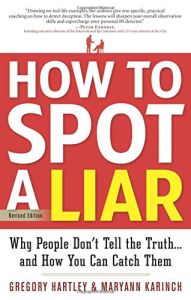
How to Spot a Liar
Why People Don't Tell the Truth...and How You Can Catch Them
Recommendation
Former U.S. Army interrogator Gregory Hartley and writer Maryann Karinch collaborated on this intriguing book about the use of military interrogation techniques in personal, business and even combat situations. While this is an unusual topic, Hartley shares the details of his first-hand military experience, so his stories and examples carry extra weight. His presentation about why people lie or conceal information addresses an unusual aspect of the human psyche and human motivations. He discusses the physiological and psychological aspects of lying and then discloses some methods that military experts use to conduct serious questioning. Sometimes, readers may find it difficult to detect the business or social applicability of some of the military interrogation techniques (although you may be tempted to question your teenager in a temperature-controlled environment), but the book is quite useful when it goes beyond military or criminal justice situations and gets down to business. Hartley and Karinch explain how to observe and interpret body language, conduct more productive arguments, and improve your personal and business relationships. Even though the text is sometimes repetitive, getAbstract recommends this book to managers, interviewers, job seekers, couples and anyone interested in self-help or psychology. The best advice the authors provide is straightforward: just tell the truth. It makes life so much simpler.
Summary
About the Authors
Gregory Hartley is a decorated former-U.S. Army interrogator. He graduated from the U.S. Army Interrogation School, and the Anti-Terrorism-Instructor Qualification Course, the Principle Protection Instructor Qualification Course, and several Behavioral Symptom Analysis Seminars. He served as an interrogator with the Fifth Special Forces Group during Operation Desert Storm. Maryann Karinch is the author of seven books, including Rangers Lead the Way; Dr. David Scherer’s Hospital Survival Guide; Diets Designed for Athletes and Empowering Underachievers: How to Guide Failing Kids.








Comment on this summary